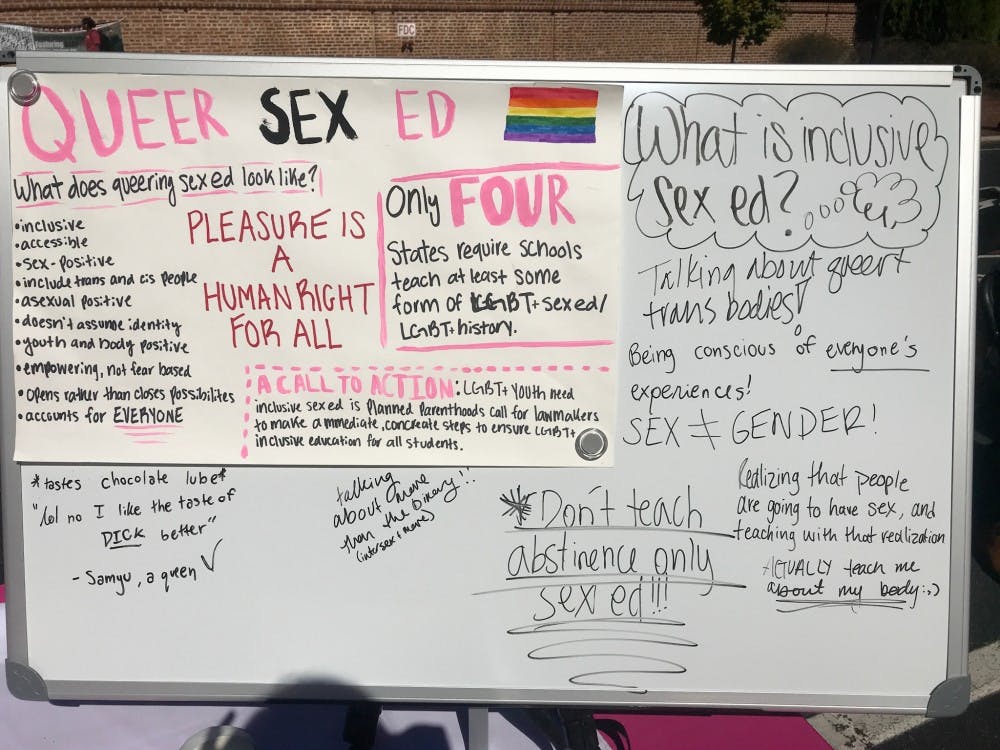Planned Parenthood Generation Action (PPGA) focused on education, legislation, getting yourself tested and contraception at its "Let's Talk About Sex (Ed)" event throughout the week on Greene Street.
During PPGA’s weekly Wednesday meetings, club founder and president Sloan Wilson said she opened discussion about possible topics for their advocacy week.
“We just thought about different topics within sex ed that are very touchy for people, and things that really matter, so we wanted to educate first of all,” said Wilson, a third-year women and gender studies and political science student.
Wednesday focused on encouraging students to get themselves tested for sexually transmitted diseases (STDs) and sexually transmitted infections (STIs).
“Getting yourself tested is really important, not only for yourself, but also for other partners that you might have in your lifetime,” Wilson said. “It’s basically just a way of being conscious of what’s going on in your body, and conscious of your own sexuality.”
While a stigma remains around discussing STDs and STIs, “1 in 2 sexually active persons will contract an STI by age 25,” according to the American Sexual Health Association. Students can get tested on campus at the Student Health Center, or can opt for testing at Planned Parenthood.
“It’s more important to be informed of the things that happen regarding sex, like STDs, STIs; you know, contraceptives, all that stuff, instead of being abstinence-only, because that’s not realistic,” club member Madison Blanding said.
PPGA set up a map of the U.S. and encouraged students to put a color-coded star over the town they grew up in. Different colors corresponded to whether the student’s sexual education was good, bad or nonexistent.
South Carolina schools teach abstinence based sexual education and do “not include instruction concerning sexual practices outside marriage or practices unrelated to reproduction except within the context of the risk of disease,” according to the Seicus State Profile.
“Abstinence only sex education is not only unrealistic, but it is uninformative and it doesn’t do anything to help kids that age," said Blanding, a second-year anthropology and women and gender studies student.
First-year aerospace engineering student Adam Torchia, who attended public school in South Carolina, said his middle school principal spoke to students about why they should practice abstinence-only.
“She said, ‘Okay, so, let’s say you really want a new North Face jacket for Christmas … You come down on Christmas morning and you open up the box, and it’s a used jacket,'” Torchia said. “It looks frayed, has holes in it. Or, she said, 'Would you rather have that, or a jacket that you pull out, it's new, it has the tags on it?' She said, 'Don’t be the tatty North Face jacket.’”
Not only does abstinence-only education pose potential issues concerning sexual health, it also disregards students who aren’t heterosexual or cisgender, Blanding said..
“It is important for those kids that are identifying as queer or non-gender conformative to be represented in sex ed and to know what kind of things they need to be looking out for,” Blanding said.
Overall, PPGA members said they hope the organization educates students on safe sex techniques and tries to break the stigma around talking about sex.
“The more you know about something, the more comfortable you’re going to be with it,” Katherine McCain, a second-year biology student, said. “If we don’t get into the cycle of knowledge about sex … we’re going to continue to have this kind of stigma and ignorance when it comes to sex which leads to more problems … Sex is fun, sex is cool, but it should be safe.”
"Let's Talk About Sex (Ed)" will continue Oct. 24 from 11 a.m. to 2 p.m.

